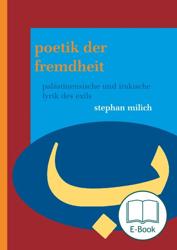This first study on contemporary Arabic exile poetry focuses on four poets who contributed essentially to the innovation of the contemporary Arabic “Qa“īda”: Sa ͑dī Yūsuf (b. 1934) and Kamāl Sabtī (1955–2006) from Iraq as well as Zakariyyā Muḥammad (b. 1951) and Ghassān Zaqṭān (b. 1954) from Palestine. The comparative work offers a profound interpretation and exhaustive analysis of the main features, topics and motifs relevant to Arabic exile poetry today making use of postcolonial (Homi Bhabha), deconstructivist (Jacques Derrida) and hermeneutic (Paul Ricoeur) theories. Oscillating between the loss of identity and its recovery, between nostalgic and traumatic remembrance both of their past and their homelands, the poets strive to find new poetic and meta-poetic forms and linguistic expressions for a world experienced as being out of joint.
„Exil ist das Nichtzugehörigsein par excellence. Der Exilant lebt einzig in seinem ersten Gedächtnis. Dieses Gedächtnis wird ihm Heimat und Identität.“
Mahmud Darwisch
Zahlreiche arabische Literaturwissenschaftler, Kritiker und Autoren weisen immer wieder auf die zentrale Bedeutung des Exils (manfan, nafi) für die arabische Gegenwartslyrik hin. Dennoch liegen bis heute kaum literaturwissenschaftliche Studien vor, welche arabische Dichtung unter dem Vorzeichen des Exils analysieren. Die systematische Untersuchung mit zeitgenössischer arabischer Exillyrik befindet sich trotz der häufigen Wiederkehr von Exilmotiven, biografischer Exilerfahrungen zahlreicher bedeutsamer Autoren und der auffälligen Dominanz des Themas „Exil“ in arabischen Intellektuellendiskursen in einem Anfangsstadium.
Da das Exil sowohl im palästinensischen (beginnend mit dem ersten arabisch-israelischen Krieg 1948) als auch im irakischen Kontext (besonders unter der Herrschaft Saddam Husseins 1979 bis 2003) besonders präsent und folgenreich ist, stehen im Mittelpunkt dieser ersten umfassenden Studie zur arabischen Exildichtung zwei palästinensische und zwei irakische Lyriker, die in ihren Gedichten höchst unterschiedliche und eigenwillige Konzepte, Bilder und Vorstellungen von Exil entwerfen: Sa’di Yusuf (Jg. 1934) und Kamal Sabti (1955 bis 2006) aus dem Irak und Zakariya Muhammad (Jg. 1951) und Ghassan Zaqtan (Jg. 1954) aus Palästina. Allen Autoren ist gemeinsam, dass sie eine individuelle Vorstellungswelt von Exil entwickeln, mit der sie ihre biographisch und immer auch politisch erfahrene Verbannung in Sprache ‚übersetzen‘, ältere Exiltexte dabei radikal umschreiben und eine neue arabische Poetologie begründen. Eine Leitfrage der Studie, die vor allem die Gedichte aus den frühen 1990er Jahren bis 2004 in Betracht zieht, lautet: Wie wirken sich die individuelle und kollektive Erfahrung des Exils und des Aufenthalts in der Fremde thematisch, formal, poetologisch und sprachlich auf die lyrischen Texte aus? Damit zusammenhängend wird weiter untersucht, wie die biographischen, oft traumatischen Erfahrungen des Exils und der Rückkehr literarisch verarbeitet und repräsentiert werden. Welche ästhetischen und thematischen Strategien entwickeln die Autoren, um ihre Exilsituation literarisch zu bewältigen? Um das Werk und die Selbstverortung jedes einzelnen Lyrikers präziser einordnen und verstehen zu können, führt die Untersuchung die Kategorie des Post-Exils (ma ba‘da l-manfa) ein. Anhand einer an Paul Ricoeur, Jacques Derrida und Homi Bhabha angelehnten Phänomenologie des (Post-)Exils werden die Gedichte in einen Dialog mit theoretischen Texten gebracht, der es erlaubt, die bisweilen hermetische und opake Lyrik umfassend zu beleuchten und zum Verstehen zu bringen.
Die Dissertation umfasst zahlreiche literarische Übertragungen bedeutender Gedichte in deutscher Erstübersetzung. Sie beleuchtet nicht nur wesentliche Aspekte moderner arabischer Dichtung, die schwierigen sozio-politischen Verhältnissen in arabischen Ländern und die Lebensbedingungen arabischer Exilanten im Westen, sondern ist durch ihren Materialreichtum, ihre sprach- und formbewusste Analyse sowie ihren literatur-theoretischen Ansatz bedeutsam für die Erforschung von Exilliteratur insgesamt.
Stephan Milich studied Islamic Sciences, German Literature and Social Studies at the Universities of Freiburg and Cairo. He is the author of a study on Mahmoud Darwish’s late poetry (Fremd meinem Namen und Fremd meiner Zeit: Identität und Exil in der Dichtung von Mahmud Darwisch, 2004) and translated Darwish’s volume “State of Siege” into German (Belagerungszustand, 2005). He has translated numerous poems from Arabic into German and has published articles and essays on Modern Arabic Literature. Writing his PHD thesis on contemporary Arabic exile poetry, his main interest of research is on modern Arabic poetry, exile discourses, Iraqi prose and film as well as Arabic children’s literature. From 2008 to 2009, he worked at the Center for Near and Middle Eastern Studies at Marburg University. Since autumn 2009, he is research assistant at the Seminar of Arabic and Islamic Studies at Göttingen University
Literatures in Context is a peer-reviewed book series devoted to Near Eastern and North African literatures. The editors want the title of the series to be understood programmatically. They presuppose a concept of world literature that includes Near Eastern and North African literatures. What is more, they assume that literatures are in many ways marked by intertextuality, that they constitute readings of extremely diverse earlier texts, and that they are posited within a field of tensions, much broader than their respective national language. For the earlier eras of Near Eastern and North African literatures, this field of tensions geographically covers the regions of the Southern and Eastern Mediterranean and Asia Minor. In modern times, it has become a space of interaction that has long since included “global” Western literatures (and realities). This does not imply that the modern Near Eastern and North African literatures have severed themselves from their predecessors. Instead it is precisely the tension between different sets of references in modern Near Eastern and North African literatures, or their “local historical context”, which is a great part of their attraction, that remains a crucial field of research for the modern scholar.


 Table of Contents
Table of Contents